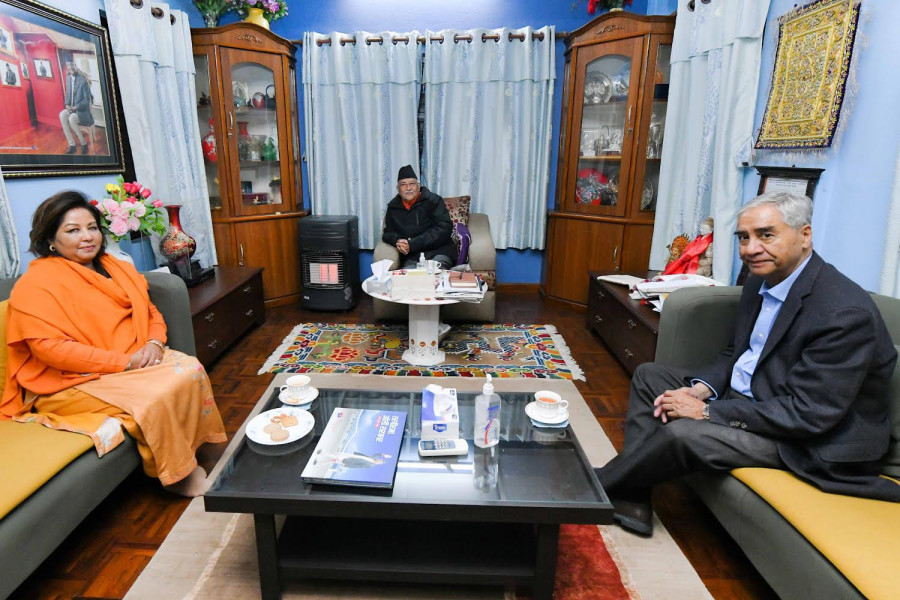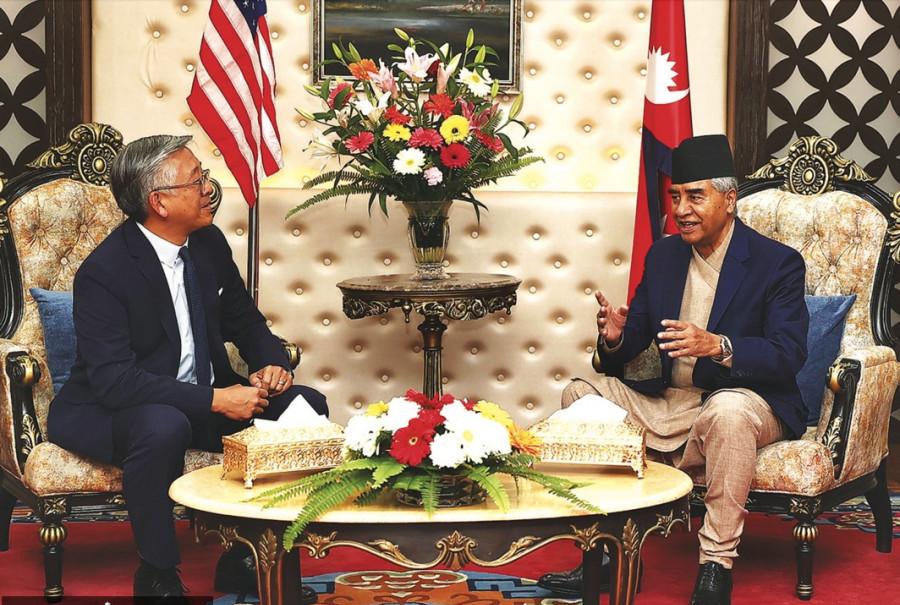Politics
Unified Socialist to allow MCC pact’s tabling in the House
The scenario surrounding the US grant’s parliamentary ratification seems to be changing with the party maintaining a tough position softening its stance.
Tika R Pradhan
The CPN (Unified Socialist), a coalition partner in the Sher Bahadur Deuba government which had taken a tough stance on the Millennium Challenge Corporation-Nepal Compact, has decided to allow its tabling in Parliament.
With this new development, the relation between the coalition partners, which seemed to be heading towards an accident, appears to be improving again. However, the parties are not yet clear whether the MCC compact would be tabled in the House on Sunday.
A Standing Committee meeting of the party on Saturday decided not to oppose it if the government moves to table the MCC compact in Parliament.
“We won’t be an obstacle if the government tables the compact in the Parliament,” Jagannath Khatiwada, spokesperson for the CPN (Unified Socialist), told reporters after the Standing Committee meeting.
The party, however, has maintained its position that ratification will be allowed only after some of the concerns surrounding the compact are addressed.
“We have trust in our lawmakers that they won’t betray the people,” said Khatiwada, adding that since there is so much opposition to the compact, lawmakers won’t stand in favour should it be put to a vote for ratification.
CPN (Unified Socialist), led by former CPN-UML leader Madhav Kumar Nepal, is the second biggest force in the current five-party coalition to oppose the $500 million American grant, after the Communist Party of Nepal (Maoist Centre).
The Deuba government has so far delayed its plan to table the grant agreement in Parliament twice—on Wednesday and Friday.
Wednesday’s plan to table the compact was withdrawn after Maoist chair Pushpa Kamal Dahal sought more time for discussion to build consensus. After the five coalition partners on Thursday failed to arrive at a conclusion, Deuba had reached out to UML chair and former prime minister KP Sharma Oli.

The government was expected to table it at Friday’s House meeting but Prime Minister Deuba decided not to after Madhav Nepal sought time until Sunday, saying his party had called a meeting of its Standing Committee.
While the Maoist Centre has maintained a consistently tough position against the MCC compact, there were differing voices in the CPN (Unified Socialist), with some in favour of its tabling and others, including senior leader Jhala Nath Khanal, a former prime minister, and party general secretary Beduram Bhusal, standing firmly against.
Saturday’s meeting, according to Khatiwada, has entrusted the party’s Secretariat with the task of taking necessary decisions on the MCC based on the party’s decision not to endorse the grant by accepting all its conditions in their current form.
The Unified Socialist’s move seems to have spared the ruling alliance a breakdown at least for now.
On Wednesday, the Maoist Centre Parliamentary Party decided to withdraw support to the government if the MCC compact was tabled in the House “in its current form”.

The two communist forces have been demanding amendments to some of the provisions of the MCC compact, which the United States has categorically denied multiple times.
If the CPN (Unified Socialist) decides to allow tabling of the compact, the Maoist Centre is likely to come under pressure to take a softer stance on the American grant.
Prime Minister Deuba appears firm on fulfilling his commitment made to the United States that the grant meant for building electricity transmission lines and improving roads in Nepal will be tabled in Parliament and ratified.
Washington has communicated to the Nepali leadership that they have until February 28 to table the grant agreement. Pressure from the United States has doubled Deuba’s dilemma. If he tables the compact, the coalition could break down; if he does not, he runs the risk of inviting American wrath, as some officials have already warned of consequences.

Observers say Nepal’s failure to balance geopolitics in the neighbourhood by using the country’s friendly nations to its benefit without ruffling their feathers could seriously affect Kathmandu’s international relations.
In particular, Beijing has voiced its concern over reports of top officials from Washington putting pressure on Nepali politicians to ratify the compact within the time they promised to.
During a media briefing in Beijing on Friday, Chinese Foreign Ministry spokesperson Wang Wenbin said that China is glad to see the international community conducting development cooperation with Nepal to contribute to its economic growth and livelihood improvement.
“However, such cooperation should be based on full respect for the will of the Nepalese people and come with no political strings attached. We oppose coercive diplomacy and actions that pursue a selfish agenda at the expense of Nepal’s sovereignty and interests.”
This led the United States to reiterate on Saturday its position on the acceptance of the assistance from the American people that whether Nepali leaders ratify the MCC is a decision for Nepal to make, as a sovereign democratic nation, and Nepal's decision alone.
“This $500 million Millennium Challenge Corporation grant is a gift from the American people and a partnership between our nations that will bring jobs and infrastructure to Nepal and improve the lives of Nepalis,” the US Embassy in Kathmandu stated.
“This project was requested by the Nepali government and the Nepali people and designed to transparently reduce poverty and grow the economy of Nepal.”
The statements and counter-statements from the United States and China with regard to Nepal are a result of their rivalry, said former foreign secretary Madhu Raman Acharya. It is the choice of Nepal whether to accept the MCC or not, he added.
“We have to exert our sovereign rights and strategic autonomy in such a situation. The Foreign Ministry should make it clear that we will not tolerate any outside influence. Nepal has a long history and experience of dealing with big neighbours and major powers of the world in exercise of independent foreign policy,” said Acharya.
“It does not need instruction or interference from any of them in choosing foreign aid, investment or whatever that is in its interest.”
There are calls from the civil society on Nepal’s political leadership to handle the country’s foreign affairs tactfully, especially at a time when major world powers are engaged in a rivalry akin to the Cold War era.
Nischal Nath Pandey, director of the Center for South Asian Studies, said that for the first time in the country’s history, major powers are in direct confrontation with each other in relation to Nepal.
“This could turn Nepal into a boxing ring. Senior leadership should be consulting with experts on how to move forward. This is a historical test of Nepali leadership's smartness and diplomatic acumen,” said Pandey.
The next meeting of the ruling alliance has been scheduled for 10am Sunday. The meeting is said to be decisive on whether the current coalition will continue or if there will be new political alliances. Given the consistent position of Deuba’s Nepali Congress party that the US grant should be accepted for Nepal’s economic development, he is said to be ready even to embrace the opposition UML for the sake of saving his government and keeping his promise to Washington.
Deuba’s suspicions are fuelled also by the fact that despite being partners in the government, the Maoist Centre and the Unified Socialist parties have deployed their sister wings on the streets to protest against the MCC compact.
Unified Socialist chair Madhav Nepal said his meeting with Dahal and Upendra Yadav, chairman of the Janata Samajbadi Party, could not happen on Saturday due to Yadav’s absence.
“Our party has taken a concrete decision but let’s see how the Maoist Centre and the Janata Samajbadi would present their views on Sunday,” Nepal told the Post about the planned meeting. “I think things will be clear within a few days.”
The Maoist Centre’s position, especially in the wake of the Unified Socialist softening its stance, has not been clear yet.
A Maoist minister in the government, however, said with the decision of the Unified Socialist to allow the government to table the MCC, “our party is also under pressure to follow suit”.
“There will be pressure on our party not to block the MCC from being discussed in Parliament,” the minister told the Post.
Another prominent Maoist leader, Haribol Gajurel, said: “Actually, we are also not against tabling the MCC but our point is that there must be a conducive environment for it.”
“Our concern is how to table it in the midst of House obstruction [by the UML] and without forging a national consensus,” said Gajurel, also a lawmaker from the Maoist Centre.
According to some leaders of the ruling coalition, the Maoist Centre and the Unified Socialist have been proposing that the prime minister delay endorsement of the MCC by continuing with the discussions after tabling it in the House. However, the prime minister is firm on its endorsement within February 28—the deadline issued by the US government—even with the help of the main opposition UML. The UML has been obstructing the House for months over the issue of Speaker Agni Sapkota not accepting its demand to strip 14 lawmakers of their positions.
CPN-UML leaders have been saying that the party will come up with its position only after the government tables the MCC for parliamentary consideration. They would then decide whether to support its ratification or not.
(Anil Giri contributed reporting.)




 22.17°C Kathmandu
22.17°C Kathmandu















